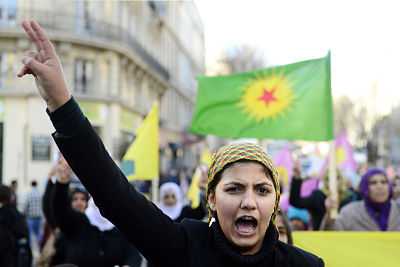Posted by Olga Khazan on January 10, 2013 at 12:13 pm
It’s still unclear who killed three women prominent in Turkey’s Kurdish autonomy movement, who were found shot to death in Paris on Thursday, and why. One of the three, Sakine Cansiz, was a founding member of the rebel PKK movement and first senior female member of the organization. The other two, Fidan Dogan and Leyla Soylemez, where activists working on behalf of the PKK in Europe.

Turkish nationalists and Kurdish officials are each blaming the other for the slayings, which threaten to derail recent peace talks between the Turkish government and a jailed PKK leader.
One theory holds that the murder might have been prompted by internal feuding among the PKK, which is regarded as a terrorist group by Europe, the United States and Turkey. Huseyin Celik, the deputy chairman of Turkey’s ruling party, suggested the killings were an attempt to stop the peace deal.
“Whenever in Turkey we reach the stage of saying ‘friend, give up this business, let the weapons be silent,’ whenever a determination emerges on this, such incidents happen,” Celik told reporters in Ankara.
The Turkish daily Hurriyet said Cansiz was “known for her opposition to the alleged head of the PKK’s armed-wing, Syrian citizen Ferman Hussein.”
From the other side: PKK Europe secretary Zubeyir Aydar and other Kurdish political figures implied that the so-called Turkish “deep state” were behind the murders. The deep state is sort of a shadow government of military officers and civilians who have for decades “suppressed and sometimes murdered dissidents, Communists, reporters, Islamists, Christian missionaries, and members of minority groups—anyone thought to pose a threat to the secular order,” in Turkey according to a New Yorker profile of the group. The enmity between Kurds and the deep state goes back decades, the article said:
[The Deep State] played a central role in combating the Kurdish insurgency of the nineteen-eighties and nineties—the so-called dirty war—when tens of thousands of guerrillas and civilians were killed or disappeared. Death squads in predominantly Kurdish cities like Diyarbakır operated with near-impunity, even using a signature vehicle: a white Renault sedan, in which military-age Kurdish males were often taken away.
The PKK took up arms in 1984 and to demand greater rights for Turkey’s Kurds, who make up 20 percent of the population. The last 18 months have seen the heaviest fighting between the PKK and Turkish forces in more than a decade.
Earlier this month, the head of Turkey’s National Intelligence Organization met with the jailed PKK leader Abdullah Ocalan at the Imrali Island Prison off the coast of Turkey to try to put an end to the conflict, which has claimed the lives of 40,000 people.
The talks revolve around three central points: amnesty for PKK members in prison, house arrest for Ocalan and the PKK giving up arms, according to Al Monitor.
The government is expected to reward a ceasefire with more rights for the Kurds, but Turkish Prime Minister Erdogan has resisted the rebels’ demand for the release of Kurdish activists.
“There will be neither amnesty nor house arrest,” he said.
Al Monitor offers more on thae meeting:
One, there will be no division of land.
Two, there is no bargaining on territory that could imply an independent Kurdistan. In any case, the PKK has not been making such a demand for some time now.
Three, there will be no alternative governance including a federation.
Four — and this is the most important — there is no democratic autonomy. Yes, you heard it right. The democratic autonomy Ocalan had envisioned and the Peace and Democracy Party [BDP, Kurdish] had unilaterally declared at the most critical phase of the Oslo negotiations, is not in the new accord Fidan and Ocalan agreed on.
Therefore there will no demand for indigenous defense forces, for popular district committees or to draw a boundary for autonomous areas.
Because the details of the peace road-map are still so sketchy, it’s hard to tell which party would feel weakened by the deal or whether either was involved in the murders. The PKK might be angry over the prospect of a disarmament concession. Or the deep state and other Turkish nationalists could have been set off by the potential for amnesty for PKK members.
“Only the [Nationalist Movement Party] is standing next to the Turkish nation,” the far-right leader Devlet Bahçeli said recently, slamming Turkish leaders for talking with Ocalan. “Did our martyrs die for nothing?”
via Will the Paris shooting derail the Turkey-PKK talks?.

Leave a Reply